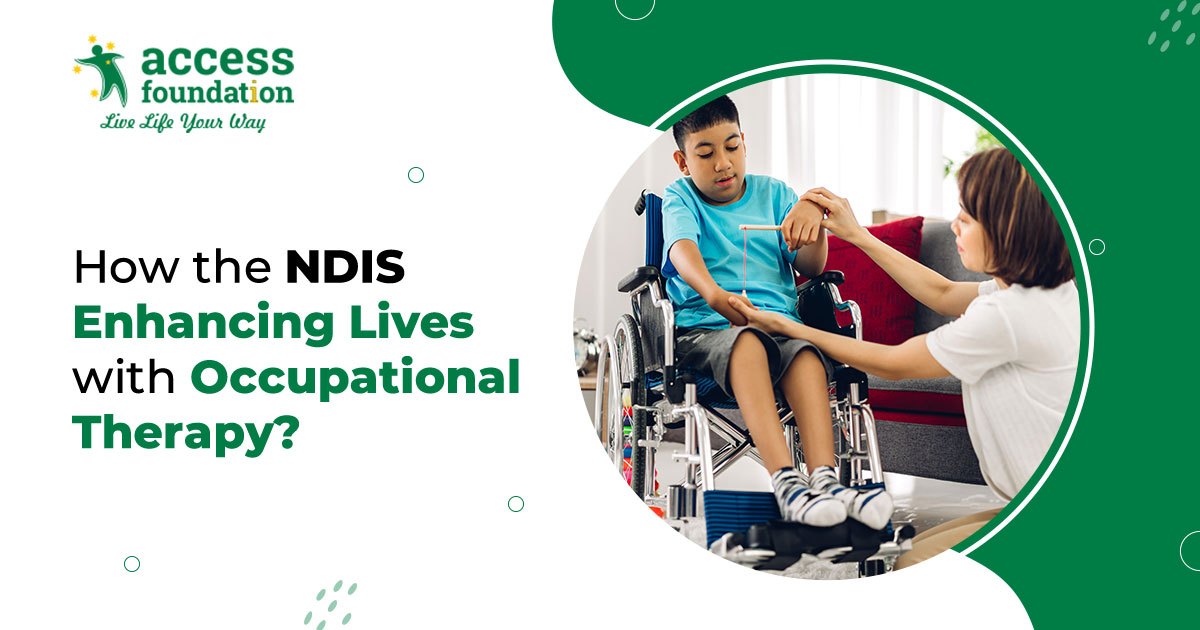
How the NDIS Enhancing Lives with Occupational Therapy?
In a world that constantly strives for inclusivity and empowerment, the National Disability Insurance Scheme (NDIS) has emerged as a beacon of hope for individuals with disabilities in Australia. Among the many services and supports offered by the NDIS, Occupational Therapy (OT) stands out as a vital resource that aims to enhance participants' lives, one step at a time.
Occupational Therapists are crucial in supporting NDIS participants to overcome obstacles and lead fulfilling lives. In this article, we will delve into NDIS Occupational Therapy, exploring its meaning, categories, and benefits that people with disability can imply in their lives.
What is Occupational Therapy?
Occupational therapy is a healthcare program based on evidence and focuses on helping individuals develop, recover, or maintain the skills needed to carry out daily living and meaningful activities. The term "Occupation" in Occupational Therapy can confuse some people because it refers to returning to work and dealing with work-related injuries.
OTs, or occupational therapists, work with individuals of all ages who may experience physical, cognitive, psychological, or developmental obstacles that hinder their daily activities. These professionals utilize therapeutic techniques and interventions to enhance functional abilities, promote independence, and improve overall well-being.
Three main categories where Occupational Therapy ensures seamless contribution
The primary purpose of OT is to help people engage in activities and tasks that matter to them. It includes self-care, work/profession, education, leisure, and socializing. Occupational therapists evaluate an individual's strengths, limitations, and environmental factors to tailor treatment plans.
Leisure: Taking part in activities that promote relaxation, socializing, and pleasure.
Reading the Newspaper/Blogs/Articles
Creative Outlets (Painting)
Playing Sorts
Developing play skills
Social skill development (Public speaking, Engaging in Activities)
Self-care/Love: To help people maintain or improve their activity and independence in their daily lives.
Showering
Grooming
Feeding
Sleep
Applying makeup
Cooking
Bathroom Activity
Productivity: People find meaning in their lives by contributing to others.
Schoolwork
Parenting
Volunteering
Finding employment
Home modifications
Meal preparation
Fine and gross motor development
Mobility training and transfers
Benefits of Occupational Therapy
The benefits of NDIS Occupational Therapy can vary depending on individual needs and circumstances. The services are tailored to address specific challenges and promote each participant's optimal functioning and independence. Some key advantages of it include:
Enhanced Independence
It assists people in enhancing their capabilities to perform daily tasks without any or minimal external help. It includes self-care, mobility, communication, and household management.
Personalized Interventions
Occupational therapists collaborate closely with participants to understand their strengths, limitations, and preferences. They design plans to encourage progress and success by taking an individualized approach.
Functional Skills Development
Occupational therapists help individuals develop and improve abilities related to daily activities such as dressing, eating, grooming, bathing, using assistive tools, and organizing personal care routines.
Collaboration and Support
By frequently working alongside healthcare professionals, educators, support workers, and family members, OTs provide valuable insights, strategies, and recommendations to ensure participants' optimum care.
Sensory Integration
Trained occupational therapists who specialize in sensory integration techniques can assist in developing strategies to help individuals manage sensory sensitivities and enhance their sensory processing abilities.
Does NDIS support and fund Occupational Therapy?
Yes, the National Disability Insurance Scheme (NDIS) ensures end-to-end support and funding for Occupational Therapy.
Assessment Recommendation Therapy or Training – Occupational Therapist (for participants older than 9)
Early Childhood Supports – Early Childhood Professional (for participants younger than 9)
The eligibility criteria for the NDIS Occupational Therapy services in Australia were as follows:
You must be age between 9 to 65
You must be an Australian citizen, a permanent resident, or a New Zealand citizen with a Protected Special Category Visa.
Your disability should substantially and permanently impact your ability to participate in daily activities and society.
You must provide evidence of your disability, including medical reports, assessments, and other relevant documentation.
The disability should be permanent that require continuous support.
Once you meet the mentioned requirements and present the valid documents, you will get access to Occupational Therapy funding from the NDIS.
Get Access to Occupational Therapy now!
Australians and Non-Australians with permanent residency and disability can receive funds for Occupational Therapy under NDIS. Access Foundation is a registered NDIS service provider that can help them enable complete support and fund for the same.
If you or any of your loved ones are seeking help for OT from a renowned service provider in Australia, we are your one-stop destination. Don't hesitate to call (08) 6243 9569 or email us info@accessfoundation.com.au at your convenience for end-to-end support and guidance.

